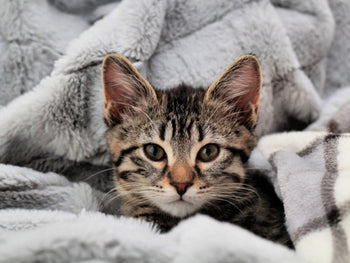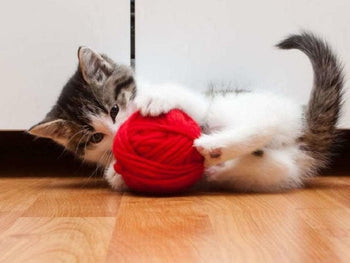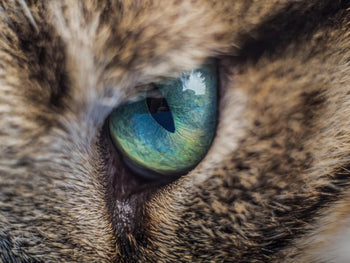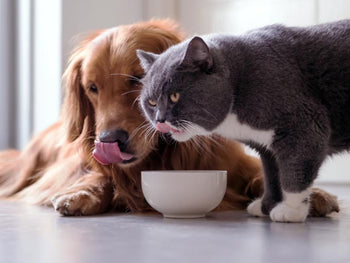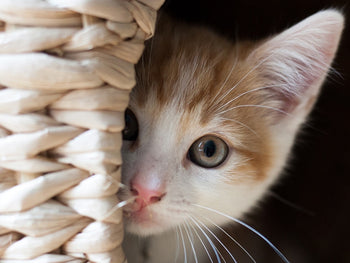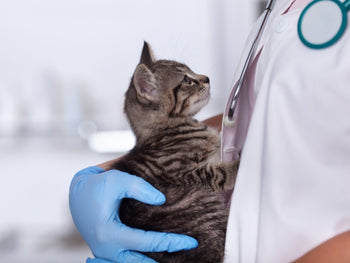
It's common knowledge among cat parents that the felines excel at hiding signs of illness. Hence, it's essential that people keep an eye out for odd signs in the daily routine of their cats: eating, drinking, and of course, eliminating. In the case everything proceeds just like usual, the pets should be in good health. On the other hand, if you notice blood in the litter box of your cat, something must have gone wrong. In fact, one of the most common reasons that make pet owners take their cats to the local vets is "my cat is peeing blood".
You notice blood in the urine of your furball and don't know how to react? If that is so, this article is what you need. Down below, you shall find everything that you have to remember about Hematuria in cats including causes, treatments and preventions.
Why The Felines Pee Blood

Different pets often have different constitutions but if it comes to the issue of "my cat is peeing blood", keep the following suspects in mind.
-
Crystalluria
For most of the time, cats would be able to get rid of microscopic crystals through urination without much difficulty. That being said, on occasions, such crystals clump together and create large shards that deal damage to the tissue membranes. Without proper treatment, crystalluria (also known as urinary crystals) could cause a variety of issues such as kidney failures, urinary tract infection and so on. In severe cases, crystalluria might even lead to fatal consequences within 48 to 72 hours.
-
Urinary Tract Infection
In young cats with healthy kidneys, their urine tends to be so concentrated that bacterias have no room to grow. But as cats get older, their kidneys steadily grow weaker which results in more diluted urines, great environments for bacteria. As the bacterial infection kick in, the felines usually have a couple of signs like poor appetite, weight loss, Hematuria,... Because most affected pets experience a great deal of pain, they often urinate in other places besides the litter box in order to comfort themselves.
-
Poison
Every cat parent around the globe knows that cats like to take a bite out of everything in their surroundings, edible as well as inedible. Because of that habit, it's possible for the felines to ingest poisonous substances without supervision. Pesticides, antifreeze, drugs, bleaches, detergents, plants.... a lot of things in the average households should give the pets serious troubles. At best, cats would experience stomach upsets, diarrhea, temporary vomiting,... At worst, the felines eventually suffer organ failures and Hematuria is one of the symptoms.
-
Trauma
Compared to their stray counterparts in the outdoors, domesticated cats tend to face relatively few threats as they live indoors. Nonetheless, your furball might still get traumatic injuries if it falls from great heights and messes up its landing. In addition, the habit of lying down without bothering about the location sometime put cats right under the feet of humans. While most cats get away with some bruises, several develop internal bleeding that leaks right into the urine over time.
-
Heat
As neutering/spaying cats preempt lots of troubles, cat parents often have their kitties go through the surgery at young ages. In case you notice blood discharge in the litter box and your car cat is still capable of breeding then it's probably in heat. Aside from the blood, cats in heat often let out long meows and behave affectionately toward humans in the house. It's possible for cats as young as 4 months to get in heat, remember that if you notice blood in the urine of your cat.
Check us out for various astonishing cat tips & facts!
Tackling Hematuria In Cats: What Needs To Be Done

Many things could lead to Hematuria so a vet checkup is always a safe bet while facing the issue of "my cat is peeing blood". So take your fluffy friend straight to the local veterinary clinic after you see blood discharges in its litter box.
Generally speaking, the sooner your kitty receives medical attention, the higher the chance of recovery. Depending on the cause and the severity of the situation, the treatments could last anywhere between a couple of hours and a couple of weeks. In addition, you have to bring your cat back to the clinic periodically for examination. Regardless of what happens, it's essential that cat parents stick to the instructions of the veterinarians and refrain from giving pets medications without obtaining clearance.
Preventing Hematuria From Showing Up In Cats: Tips And Tricks

Knowing how to react to the issue of "my cat is peeing blood" is nice but it's worth noting that prevention is better than cure. If you want to protect your cat from Hematuria, you should consider implementing these precautions.
- Encourage Water Consumption: Dehydration is dangerous to cats, especially ones that have urinary tract issues. To ensure that your furball stays hydrated, ensure that it's able to access freshwater. Feline experts also suggest that to get the pet to drink more water, cat parents could add additives such as chicken broth into the water. As some cats prefer to drink from moving water, it's also a good idea to invest in some cat fountains. You would be able to get such fountains from pet stores at affordable prices these kinds of days.
- Set Up Plenty Of Exercises: Cats that exercise on a daily basis should be less likely to develop urinary tract issues compared to other felines. That is why it's strongly recommended that you spare time to lay with your fluffy friend every now and then. In case you have a rather tight schedule, purchase some interactive toys in order to keep your cat occupied. As cats like to jump on high places and swipe against surfaces, cat trees and scratching posts work as well.
- Keep The Environment Stress-Free: Similar to humans, the average cats don't live a healthy life if they have to face constant stress day after day. Therefore, it's widely advised that you keep the noise down and take your kitty into account before making changes to the interior.
Read more Cat's Health Guides and find fun stuff on Cattybox!
